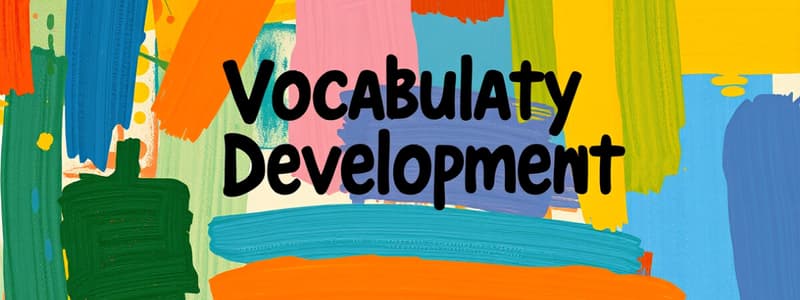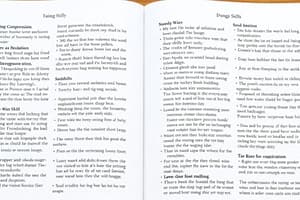Podcast
Questions and Answers
What is the primary difference between receptive vocabulary and productive vocabulary?
What is the primary difference between receptive vocabulary and productive vocabulary?
- Receptive vocabulary consists of words understood when heard or read. (correct)
- Receptive vocabulary includes words that are actively used in speech.
- Productive vocabulary is only relevant in written communication.
- Productive vocabulary is larger than receptive vocabulary.
How do context clues assist in vocabulary development?
How do context clues assist in vocabulary development?
- By identifying word meanings through surrounding text. (correct)
- By replacing the need for reading in context.
- By providing definitions for all new words encountered.
- By enhancing memorization through repetition of words.
Which strategy is considered beneficial for vocabulary development through writing?
Which strategy is considered beneficial for vocabulary development through writing?
- Reading regularly to passively absorb new words.
- Engagement in conversations with limited vocabulary.
- Using flashcards exclusively for memorization.
- Practice through writing to incorporate new words. (correct)
What is the function of semantic mapping in vocabulary teaching?
What is the function of semantic mapping in vocabulary teaching?
What type of vocabulary development strategy is reading regularly classified as?
What type of vocabulary development strategy is reading regularly classified as?
Which of the following is NOT a tool or resource for vocabulary development?
Which of the following is NOT a tool or resource for vocabulary development?
What is the main goal of explicit instruction in vocabulary teaching?
What is the main goal of explicit instruction in vocabulary teaching?
How do vocabulary apps enhance the learning experience?
How do vocabulary apps enhance the learning experience?
Study Notes
Vocabulary Development
Importance of Vocabulary
- Essential for effective communication.
- Enhances reading comprehension and writing skills.
- Influences academic success and professional opportunities.
Types of Vocabulary
-
Receptive Vocabulary
- Words understood when heard or read.
- Larger than productive vocabulary.
-
Productive Vocabulary
- Words used in speaking and writing.
- Reflects active language use.
Strategies for Vocabulary Development
-
Reading Regularly
- Exposes learners to new words in context.
- Encourages inference of meanings.
-
Using Context Clues
- Identifying word meanings through surrounding text.
- Enhances comprehension and retention.
-
Word Mapping
- Visual representation of a word’s meaning, synonyms, antonyms, and usage.
- Aids in deeper understanding of vocabulary.
-
Practice through Writing
- Incorporating new words into writing assignments.
- Encourages active use of vocabulary.
-
Engagement in Conversations
- Using new vocabulary in discussions.
- Reinforces memory through practical application.
Tools and Resources
-
Flashcards
- Helpful for memorization and retrieval.
- Can include definitions, sentences, and images.
-
Vocabulary Apps
- Interactive tools for learning and testing vocabulary.
- Often use gamification to increase engagement.
-
Word Games
- Crossword puzzles, Scrabble, and word searches promote fun learning.
- Boosts retention and recall of vocabulary.
Techniques for Teaching Vocabulary
-
Explicit Instruction
- Direct teaching of vocabulary words with meanings and usage.
- Includes assessments to gauge understanding.
-
Semantic Mapping
- Connecting words to related concepts or themes.
- Aids in expanding word associations.
-
Thematic Vocabulary Lists
- Focusing on vocabulary related to specific topics (e.g., science, literature).
- Helps in contextual learning and relevance.
Assessing Vocabulary Knowledge
-
Quizzes and Tests
- Regular assessments to track vocabulary growth.
- Can include multiple-choice, fill-in-the-blank, or matching formats.
-
Portfolio Assessment
- Collection of student work showing vocabulary usage over time.
- Provides a holistic view of vocabulary development.
Lifelong Vocabulary Development
- Encourage continuous learning through:
- Reading diverse materials (books, articles, blogs).
- Engaging in discussions across various topics.
- Exploring new languages and cultures to enhance understanding.
Importance of Vocabulary
- Vocabulary is crucial for effective communication, impacting both speaking and writing.
- A strong vocabulary enhances reading comprehension, allowing for a better understanding of texts.
- Academic success and professional opportunities are often linked to vocabulary proficiency.
Types of Vocabulary
- Receptive Vocabulary: Comprises words recognized and understood when heard or read; typically larger than productive vocabulary.
- Productive Vocabulary: Encompasses words actively used in writing and speaking, demonstrating practical language skills.
Strategies for Vocabulary Development
- Reading Regularly: Engages learners with new words within context, fostering the ability to infer meanings.
- Using Context Clues: Teaches how to derive word meanings from surrounding text, enhancing both comprehension and memory.
- Word Mapping: Involves creating visual organizers that include meanings, synonyms, antonyms, and usage examples, facilitating deeper vocabulary understanding.
- Practice through Writing: Encourages active incorporation of new vocabulary in writing tasks, reinforcing usage.
- Engagement in Conversations: Utilizes new vocabulary in discussions, enhancing retention through real-life application.
Tools and Resources
- Flashcards: Effective tools for memorizing vocabulary with definitions, example sentences, and relevant images.
- Vocabulary Apps: Interactive applications that facilitate learning and testing through gamified experiences.
- Word Games: Engaging activities such as crossword puzzles and Scrabble that promote enjoyable learning and improve vocabulary recall.
Techniques for Teaching Vocabulary
- Explicit Instruction: Involves direct teaching of vocabulary, including definitions and context of usage, along with assessments to evaluate comprehension.
- Semantic Mapping: Connects vocabulary words to related concepts, enhancing word association skills.
- Thematic Vocabulary Lists: Focuses on vocabulary specific to particular subjects (e.g., science, literature), aiding in relevant and contextual learning.
Assessing Vocabulary Knowledge
- Quizzes and Tests: Regular evaluations designed to measure vocabulary growth through various formats, such as multiple-choice and fill-in-the-blank.
- Portfolio Assessment: Collection of student work demonstrating vocabulary application over time, offering a comprehensive overview of progress.
Lifelong Vocabulary Development
- Promotes continuous engagement with diverse reading materials, including books, articles, and blogs.
- Encourages discussions on a wide range of topics to foster deeper understanding.
- Suggests exploring new languages and cultures to further enhance vocabulary knowledge and comprehension.
Studying That Suits You
Use AI to generate personalized quizzes and flashcards to suit your learning preferences.
Description
Explore the fundamental concepts of vocabulary development, including its importance for communication and academic success. Understand the difference between receptive and productive vocabulary, and learn effective strategies such as reading regularly, using context clues, and word mapping to enhance your vocabulary skills.




